
The Iditarod Trail Sled Dog Race, more commonly known as The Iditarod, is an annual long-distance sled dog race held in Alaska in early March. It travels from Anchorage to Nome. Mushers and a team of between 12 and 16 dogs, of which at least 5 must be on the towline at the finish line, cover the distance in 8–15 days or more. The Iditarod began in 1973 as an event to test the best sled dog mushers and teams but evolved into today's highly competitive race.

A sled dog is a dog trained and used to pull a land vehicle in harness, most commonly a sled over snow.

Sled dog racing is a winter dog sport most popular in the Arctic regions of the United States, Canada, Russia, Greenland and some European countries. It involves the timed competition of teams of sled dogs that pull a sled with the dog driver or musher standing on the runners. The team completing the marked course in the least time is judged the winner.

Martin Buser is a champion of sled dog racing.
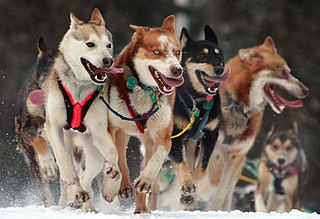
Mushing is a sport or transport method powered by dogs. It includes carting, pulka, dog scootering, sled dog racing, skijoring, freighting, and weight pulling. More specifically, it implies the use of one or more dogs to pull a sled, most commonly a specialized type of dog sled on snow, or a rig on dry land.

The Iditarod Trail, also known historically as the Seward-to-Nome Trail, is a thousand-plus mile (1,600 km) historic and contemporary trail system in the US state of Alaska. The trail began as a composite of trails established by Alaskan native peoples. Its route crossed several mountain ranges and valleys and passed through numerous historical settlements en route from Seward to Nome. The discovery of gold around Nome brought thousands of people over this route beginning in 1908. Roadhouses for people and dog barns sprang up every 20 or so miles. By 1918 World War I and the lack of 'gold fever' resulted in far less travel. The trail might have been forgotten except for the 1925 diphtheria outbreak in Nome. In one of the final great feats of dog sleds, twenty drivers and teams carried the life-saving serum 674 miles (1,085 km) in 127 hours. Today, the Iditarod Trail Sled Dog Race serves to commemorate the part the trail and its dog sleds played in the development of Alaska, and the route and a series of connecting trails have been designated Iditarod National Historic Trail.

The Yukon Quest, formally the Yukon Quest 1,000-mile International Sled Dog Race, is a sled dog race scheduled every February since 1984 between Fairbanks, Alaska, and Whitehorse, Yukon, switching directions each year. Because of the harsh winter conditions, difficult trail, and the limited support that competitors are allowed, it is considered the "most difficult sled dog race in the world", or even the "toughest race in the world"—"even tougher, more selective and less attention-seeking than the Iditarod Trail Sled Dog Race." The originator envisioned it as "a race so rugged that only purists would participate."

Jeff King is an American musher and sled dog racer. He is generally credited with introducing the sit-down sled which has largely replaced the standing sled traditionally used by distance mushers.
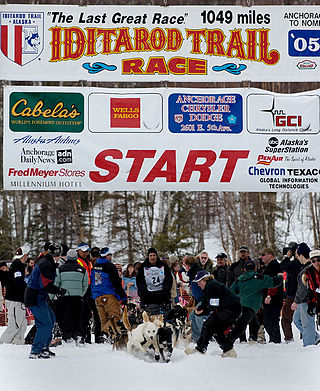
The ceremonial start of the 33rd annual Iditarod Trail Sled Dog Race across the US state of Alaska began in Anchorage on March 5, 2005, at 10 am AKST, and restarted in Willow the next day at 2 pm. After covering 1,161 miles (1,868 km) of wilderness, musher Robert Sørlie, an airport firefighter from Norway, crossed the finish line under the "burled arch" in Nome on March 16 at 8:39 am AKST. After taking care of his dogs, and an inspection to make sure all the mandatory equipment was in his sled, Sørlie was declared the winner by Race Marshal Mark Norman, with a time of 9 days, 18 hours, 39 minutes, and 31 seconds and won US$72,066.67 and a new truck. When asked how it felt to win a second time, Sørlie said "it feels good, I'm ready for breakfast." His team of dogs averaged 4.65 mi/h (7.58 km/h). The Red Lantern in last was Phil Morgan, an Alaska Airlines pilot, and when he crossed the finish line on March 21 at 8:02 pm AKST, the Widow's Lantern hanging on the burled arch was extinguished, which signaled the end of the race.
The ceremonial start of the 34th annual (XXXIV) Iditarod Trail Sled Dog Race across the U.S. state of Alaska began amidst the crowds of Anchorage on March 4, 2006, and the start of the competitive race, or "restart", began the next day in Willow. The race followed a modified version of the northern route for 1,151 mi (1,852 km) across the Alaska Range, through the sparsely inhabited Interior, along the Yukon River, and then up the coast of the Bering Sea to the city of Nome. Unlike in previous years, where the teams had to deal with unseasonably warm temperatures and soft, mushy snow, the weather was cold, with temperatures reported as low as −40 °F (−40 °C).

Ramy "Ray" Brooks is an Alaska Native kennel owner and operator, motivational speaker, and dog musher who specializes in long-distance races. He is a two-time runner up in the 1,049+ mi Iditarod Trail Sled Dog Race across the U.S. state of Alaska, and a former winner of the 1,000 mi (1,600 km) Yukon Quest dog sled race across both Canada and the U.S.

John Quniaq Baker is a self-employed American dog musher, pilot and motivational speaker of Inupiat descent who once consistently placed in the top 10 during the long distance Iditarod Trail Sled Dog Race. Baker won the 2011 Iditarod with a finish time of 8 Days 19 Hours 46 Minutes 39 Seconds.

Lance Mackey was an American dog musher and dog sled racer from Fairbanks, Alaska. Mackey was a four-time winner of both the 1,000-mile (1,600 km) Yukon Quest and the Iditarod Trail Sled Dog Race.
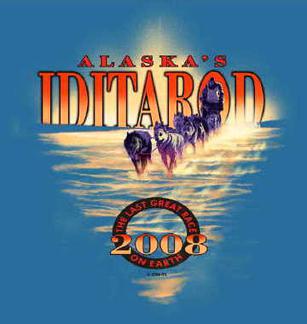
The 2008 Iditarod featured 95 mushers and dog teams. The 36th Annual Iditarod Trail Sled Dog Race ceremonially began on Saturday March 1, 2008. The competitive start was the next day.

The Jamaica Dogsled Team is a team of sled dogs and mushers headquartered at Chukka Caribbean Adventures in Ocho Rios, located in Saint Ann Parish, Jamaica. The dog team is made up of strays rescued by the Jamaica Society for the Prevention of Cruelty to Animals and offers dryland dogsled rides, along with the adventure center's other outdoor experiences. In addition, the two mushers Newton Marshall and Damion Robb, compete in sled races throughout the US and Canada, using leased dog teams. Country music singer Jimmy Buffett's Margaritaville is the team's major sponsor.

The 38th Annual Iditarod Trail Sled Dog Race saw 71 participating teams from the United States, Jamaica, Canada and United Kingdom. The ceremonial start was held in Anchorage on March 6. The official restart was held one day later in Willow.

Aliy Zirkle is an American champion of sled dog racing.
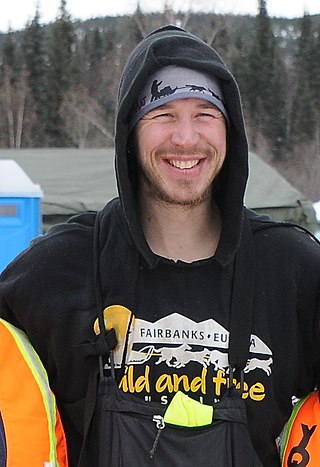
Brent Sass is an American dog musher who is one of only six people to have won both the Iditarod and Yukon Quest sled dog races.
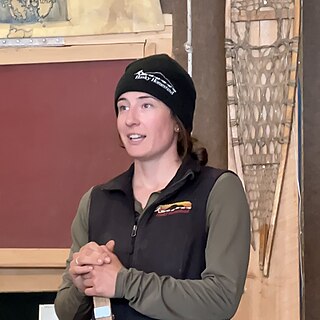
Amanda Otto is an American musher and sled dog racer. In 2022 she made her rookie run with a team of Alaskan huskies in the Iditarod and in 2023 placed second in the Yukon Quest, where she was called out by race organizers and race veterinarians, in a rare unanimous decision, for exemplary treatment of her dogs.



















